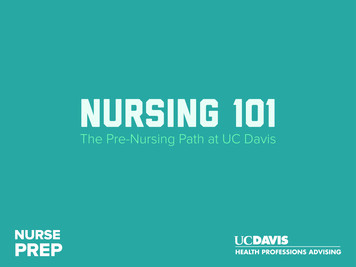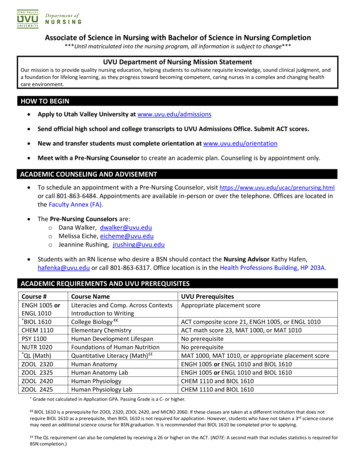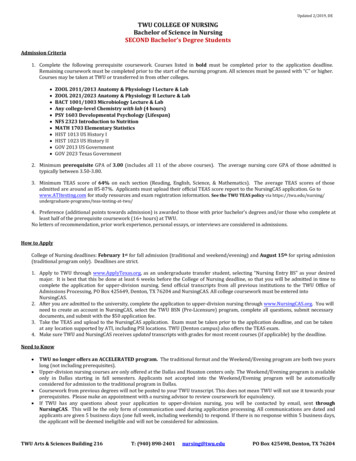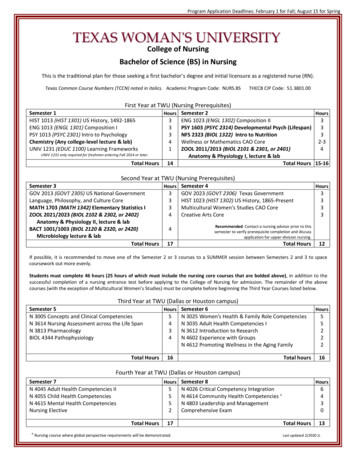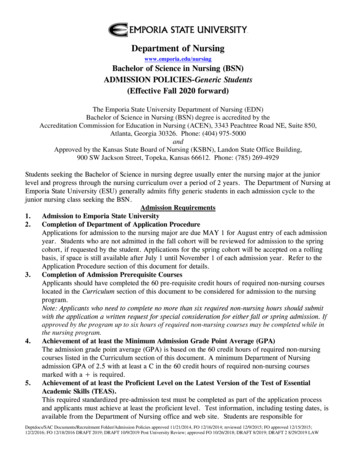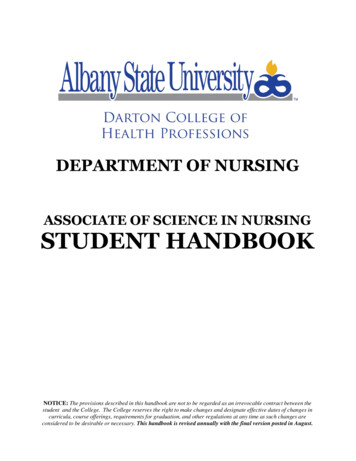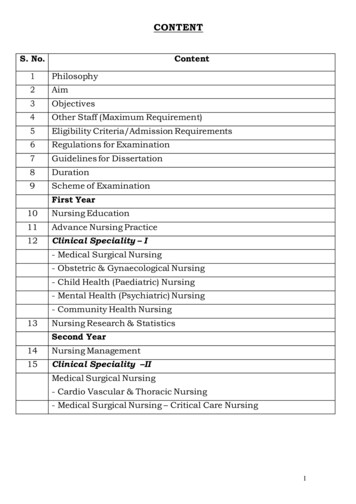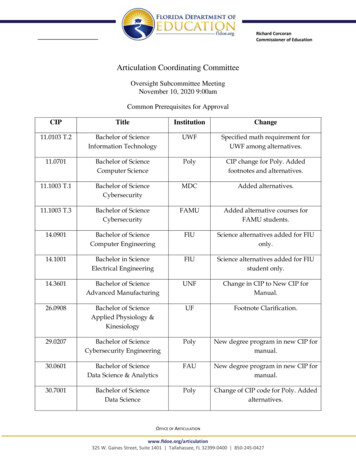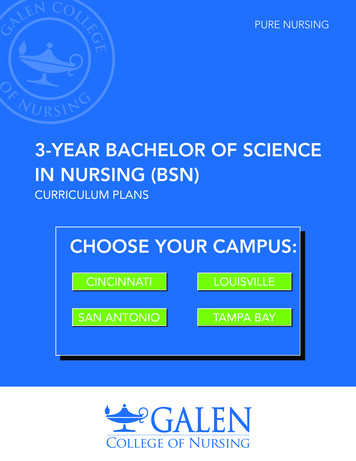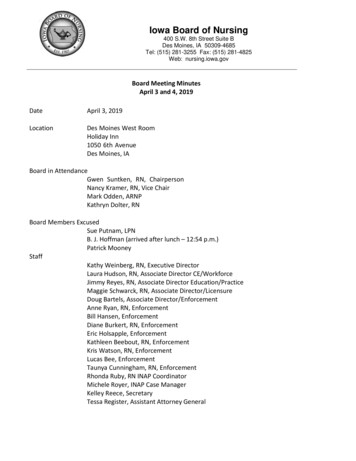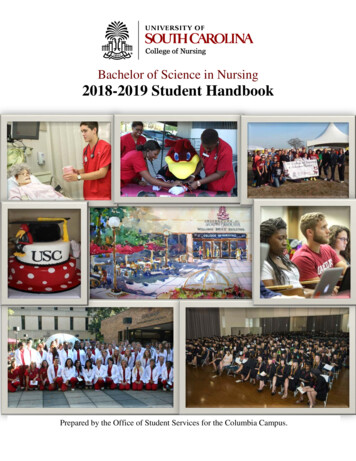
Transcription
Bachelor of Science in Nursing2018-2019 Student HandbookCOLLEGE OF NURSINGUNDERGRADUATE STUDENT HANDBOOK2015-2016INTRODUCTIONThe College of Nursing Undergraduate Student Handbook provides students with current informationregarding curricula, policies, and other important information regarding the undergraduate programs in theCollege. The Handbook is updated annually. It is important that students become familiar with the currentHandbook (http://www.sc.edu/study/colleges schools/nursing/internal/2014 2015 bsn handbook.pdf)The Handbook is organized into the following general categories: (1) Information about the College; (2)Baccalaureate Programs; (3) Academic Standards for Progression for Undergraduate Students; (4)Special Policies for Undergraduate Students; (5) Resources and Support Services; (6) Graduation; and(7) Appendices.INFORMATION ABOUT THE COLLEGE OF NURSINGThe Carolina Core provides the common core of knowledge, skill, and academic experience required forall Carolina undergraduate students. A student’s plan of study follows the bulletin under which they areadmitted.COLLEGE OF NURSING MISSIONThe mission of the College is to integrate education, research, and service to develop competent andcaring nurse leaders who will shape health care and health care delivery with new knowledge, evidencebased practice, partnerships, and policy to facilitate optimal health outcomes for individuals, families andcommunities. Learn more about the College of Nursing dex.php)The following core values provide a framework of our philosophical beliefs:COLLEGE OF NURSINGUNDERGRADUATE STUDENT HANDBOOK2015-20160Prepared by the Office of Student Services for the Columbia Campus.
COLLEGE OF NURSINGUNDERGRADUATE STUDENT HANDBOOK2018-2019TABLE OF CONTENTSForward .iTable of Contents . ii1. USC College of Nursing .11.1. Introduction .11.2. Mission Statement .11.3. Vision and Values.11.4. Accreditation .12. Academic Integrity.22.1. Ethic for Nursing .22.2. Civility and Professional Conduct .22.3. Academic Responsibility .22.4. Student Conduct .23. Academic Programs .33.1. The Baccalaureate Programs .33.1.1. Transfer Guidelines.33.1.2. End-of-Program Outcomes .33.1.3. Curriculum .43.1.4. Change of Major Into Nursing .43.1.5. Minors.53.1.6. Senior Privilege Enrollment n Graduate Courses .53.1.7. Timeline .53.2. Overview of RN-BSN .54. Computer Policy .75. Academic Policies and Procedures .85.1. Core Performance Standards.85.2. Student Progression with Course of Study .85.2.1. Academic Advisement . 105.2.2. Academic Probation and Academic Warning . 105.2.3. Attendance . 105.2.4. Adding, Dropping, or Withdrawing from a Course . 115.2.5. Requests for Approval of Semester Hours Overload. 115.2.6. Transfer of Credits . 115.2.7. Grades. 115.2.8. Academic Honors. 135.2.9. Standardized Assessment Tests. 135.2.10. Examination Procedure . 135.2.11. Final Exams . 145.3. Questions/Concerns . 145.3.1. Chain of Command . 145.3.2. Petition Process . 14ii
5.3.3. Student Grievances. 145.4. Separation from the College of Nursing . 155.4.1. Leave of Absence . 155.4.2. Withdrawal from the University . 155.4.3. Suspension . 155.5. Degree Completion and Graduation. 155.5.1. State Authorization Reciprocity Agreement (SARA). 155.5.2. Graduation and NCLEX-RN Testing . 165.5.3. Immigration/Legal Standards . 165.6. Graduate Recognition and Commencement . 175.6.1. Application for a Degree . 175.6.2. Graduation with Honors . 176. Clinical Placement and Activities . 186.1. Overview . 186.1.1. Clinical Simulation Laboratory (CSL) . 186.1.2. Clearance Requirements for Clinical Experience. 186.1.3. Guidance for All Clinical Experiences . 206.1.4. Unsafe Clinical Practice . 226.1.5. Alcohol/Drug Policy . 246.1.6. Equipment Kit . 246.1.7. Policy for Clinical Attire . 246.1.8. Attendance at Clinical Experiences . 267. Non-Academic Policies and Procedures . 277.1. Change of Name or Address . 277.2. Outside Employment . 277.3. Communication . 277.4. Copyright Policy . 277.5. Social Media. 287.6. Campus Transportation . 297.7. Statement of Responsibility/Waiver of Liability . 297.8. Parking . 297.9. College of Nursing Fire Evacuation Procedures . 298. Resources and Support Services . 308.1. Self-Service Carolina . 308.2. Technology Resource Center (TRC) . 308.3. Distributive Learning Support Services. 308.4. Career Planning and Placement Office . 308.5. Bookstores . 308.6. The Libraries . 318.7. Counseling and Psychiatry Services . 318.8. Veterans Services. 318.9. Financial Assistance . 318.10. Sigma Theta Tau . 318.11. Thomson Student Health Center . 32iii
8.12. Students with Disabilities . 328.13. Undergraduate Student Professional Organizations . 328.14. Alumni . 329. AppendicesA. Code of Ethics for Nurses with Interpretive Statements . 33B. Core Performance Standards . 34C. Student Background Check Internal Policy and Procedure Statement . 36D. Student Drug Screening Internal Policy and Procedure Statement. 39E. Clinical Requirements . 42Traditional BSN . 42RN-BSN . 48F. Bloodborne Pathogens Exposure Control Panel for Nursing Students. 54G. Undergraduate Student Grievance Policy-Academic . 63H. Statement of Responsibility/Waiver of Liability . 65I. Request for Approval of Semester Hours Overload . 66J. Student Handbook Acknowledgement Form . 67iv
1. USC College of Nursing1.1IntroductionThe College of Nursing Undergraduate Student Handbook provides students with current informationregarding curricula, policies, and other important information regarding the undergraduate programsin the College. The Handbook is updated annually. It is important that students become familiar withthe current handbook.1.2Mission StatementThe University of South Carolina College of Nursing provides nationally recognized educationalprograms and advances science, practice, and policy to optimize health for all.Learn more about the College of Nursing Missionhttps://www.sc.edu/study/colleges schools/nursing/about/mission/index.php1.3Vision and ValuesVision: To be a preeminent College of Nursing of distinction that pioneers innovation, leadership, andexcellence.Values: Diversity, Inclusivity Commitment, Caring, Integrity, Respect, Professionalism1.4AccreditationThe baccalaureate program is approved by the State Board of Nursing for South Carolina and isaccredited by the Commission on Collegiate Nursing Education. The University is accredited bythe Southern Association of Colleges and Schools. The program is guided by the ANA Standards ofPractice and the ANA Code of Ethics.1
2. Academic Integrity2.1Ethics for NursingNursing is a profession, and as such, nursing students are expected to behave ethically. Ethical behaviorapplies to colleagues, peers, supervisors, subordinates, and clients. (Appendix A) contains the Code ofEthics for Nurses developed by the American Nurses Association.2.2Civility and Professional ConductAs students progress through the curriculum, they are preparing for transition into professional life. Somebehaviors expected in the classroom/clinical setting parallel many behaviors expected in the work place.CLASSROOM BEHAVIOR Attends class on time Notifies professor when unable to attend class Completes reading assignments before class Engages in class discussion Maintains appropriate demeanor during class Remains in classroom until class is dismissed Returns from breaks on time Stays awake in class Refrains from having side conversations Attends to speaker during class time Allows others to hear and learn Refrains from reading newspapers, etc., other than class materials Refrains from nonacademic computer use2.3Academic ResponsibilityIt is the responsibility of every student at the University of South Carolina-Columbia to adhere steadfastlyto truthfulness and to avoid dishonesty, fraud, or deceit of any type in connection with any academicprogram. Any student who violates the Rule of Academic Responsibility or who knowingly assists anotherto violate this rule shall be subject to discipline. See s found guilty of academic dishonesty may receive a zero for their course grade.2.4Student ConductStudent conduct issues are referred to the university-wide process.2
3. Academic ProgramsThere are differing levels of education in professional nursing including baccalaureate, masters, anddoctoral levels. Each level of professional practice has unique knowledge with a shared core of knowledgethat crosses all levels. Baccalaureate nursing education encourages the synthesis of knowledge and skillsneeded to begin professional nursing practice and to take on beginning leadership roles. The RN to BSNonline degree program is designed for registered nurses who want to advance professionally andcomplete the BSN degree.Masters nursing education builds on beginning professional practice and prepares graduates forleadership in specialized advanced practice roles. Doctorate of Nursing Practice (DNP) educationincorporates elements of masters nursing education and advanced practice and emphasizes researchutilization, leadership, and health care policy development. PhD education prepares nurses to conductindependent research, generate theories, critically analyze existing theories relevant to the discipline ofnursing, and facilitate the use of new knowledge in nursing practice. Nurses are prepared for myriad roleswithin the healthcare system because of the comprehensive knowledge they possess.3.1The Baccalaureate ProgramsThe baccalaureate program, consisting of pre-nursing lower and upper division, provides students withessential knowledge and skills. Pre-nursing lower division courses provide a foundation in liberal arts,sciences, and nursing to develop basic skills in analysis, synthesis, and evaluation. In the upper division,nursing courses combine didactic material with clinical practice to continue the preparation for thepractice of professional nursing.3.1.1Transfer GuidelinesThe Office of Undergraduate Admissions is responsible for admitting students into the College ofNursing’s Pre-Nursing Lower Division. Students must have a minimum cumulative 3.000 grade pointaverage on all attempted college-level work to be considered for admission. Students who havecompleted less than 30 college-level hours must meet freshman requirements. Please note the Officeof Undergraduate Admissions may not be able to admit all students who meet the 3.000 GPArequirement for their intended term. Admission into the College of Nursing’s Pre-Nursing LowerDivision is based on resources, space availability, and a student’s complete academic profile (includinggrades in relevant science courses). Acceptance into the Pre-Nursing Lower Division does notguarantee acceptance into the Upper Division Nursing major.The College of Nursing does not accept nursing courses from other nursing programs for the Nurse –Generic BSN (050A). This includes lower division course work that may not be coded under nursingsuch as: Clinical Nutrition and Pathophysiology.3.1.2End-of-Program OutcomesStudents in the baccalaureate programs:1. Exhibit professional personal behavior in all activities.2. Provide evidence-based clinically competent care across the continuum of care.3
3. Demonstrate cultural awareness, sensitivity, and competency in providing nursing care toindividuals, families, and groups within a diverse society.4. Make clinical judgments using reflection, critical thinking, and problem solving skills.5. Perform health promotion, risk reduction, and disease prevention activities for individuals, groupsand populations.6. Use information and health care technologies for effective health care delivery.7. Perform the professional roles of care provider, coordinator of care, member of a profession, andlife-long learner.8. Work effectively as a member of the interdisciplinary health care team.9. Assume leadership roles within the scope of professional practice.3.1.3CurriculumThe Carolina Core provides the common core of knowledge, skill, and academic experiencerequired for all Carolina undergraduate students. A student’s plan of study follows the bulletinunder which they are admitted.3.1.4Change of Major Into NursingAny USC-Columbia student interested in changing their major to Pre-Nursing Lower Divisionwithin the College of Nursing must participate in the following change of major process and meetminimum academic requirements for consideration. Acceptance into Pre-Nursing Lower Divisiondoes not guarantee acceptance into Nursing Upper Division. A separate, departmental,application is required for consideration into Nursing Upper Division. Students accepted as achange of major will receive additional information regarding when and how to apply to NursingUpper Division.Students must meet the following minimum eligibility requirements to change their major tonursing:1. A minimum Institutional of a 3.000a. Grade Forgiveness will not be factored into the calculations of your GPAs2. No more than one below C grade in a BSN required science course3. Complete a minimum of 12 graded credit hoursIMPORTANT: Due to the capacity limits of the College of Nursing, meeting the minimumrequirements does not guarantee acceptance.TIMELINE: For spring semester, all change of major applicants must submit a change of majorapplication by October 1st. For summer/fall semesters, all change of major applicants must submitthe change of major application by March 1st. Applications go live on the College of Nursingwebsite each spring and fall semester on the first day of classes. Notifications for bothacceptances and denials will be sent via email by the 15th of each of the above months.ACCEPTED STUDENTS: All accepted change of major applicants are required to attend a Collegeof Nursing New Major Information and Advising Session. This session will provide an overview of4
the BSN program, the curriculum, application process to Nursing Upper Division and will includea one-on-one advising appointment with one of the College of Nursing academic advisors.3.1.5MinorsThe College of Nursing does not require a minor. A minor is a series of courses that display a distinctcurricular pattern in one discipline that is different from the major. Undergraduate minors normallyrequire a minimum of 18 credit hours of prescribed courses. Undergraduate minors appear on thetranscripts, but not on the diplomas.If time permits or if time is reserved by the student in the planning of their curriculum, a minor ispossible. The Academic Bulletin offers a List of Minors(http://bulletin.sc.edu/content.php?catoid 56&navoid 13853.1.6Senior Privilege Enrollment in Graduate CoursesA special provision to earn graduate credit is available for USC undergraduate seniors who haveat least 90 semester hours, 3.000 Institutional, and nursing GPAs, and need less than a normalcourse load to complete the baccalaureate requirements. Under Senior Privilege, enrollmentin graduate level coursework (500 or above) is subject to the approval of the graduate programdirector for the specified course. Courses for graduate credit under senior privilege cannot beused toward undergraduate degree requirements. Completion of graduate courses under seniorprivilege does not guarantee admission to graduate school. Students need to consult with theiradvisor for appropriate enrollment forms.3.1.7TimelineThe traditional BSN program must be completed within five years of completing lower divisionprogression coursework.3.2Overview of RN-BSNThere are three admission options for the RN-BSN program; August, January, and May. Courses areoffered in a 7-week online/accelerated format. Students must apply directly to the RN-BSN programfor admission to the university. Admission is competitive.In order to be eligible for the RN-BSN program, students must meet all the admission requirements ofthe College of Nursing and University. Specific RN-BSN program admission requirements are as follows:An Associate Degree in Nursing or Diploma in Nursing from an accredited ACEN (formerlyNLNAC) programOfficial Transcripts from all schools attendedApplicationApplication FeeEnglish Proficiency Requirement***Other Supporting Materials - Criminal Background check and drug screenCurrent unrestricted Registered Nurse (RN) license to practice professional nursing in the United States5
Nursing required and Science GPA to equate to a 3.0 or greater*******International applicants must be proficient in the English language. A score of 550 or above on thepaper version of the TOEFL (Test of English as a Foreign Language) is required. (A score of 210 or higheron the computerized version is required, and a minimum score of 77 on the Internet version is required.)TOEFL scores are not required for international students from countries where the primary language ofinstruction is English nor from graduates of high schools in the United States. **** Students Nursingrequired plus science GPA between 2.8 – 2.99 may be conditionally admitted, provided they have notcompleted more than 120 hours of prior collegiate coursework [and have met all other admissionrequirements].Unless stated otherwise, the policies stated in this handbook for undergraduate students are relevant forstudents in the RN-BSN Program (http:/gradonline.sc.edu/Programs/1227/RN-BSN).The Bachelor of Science in Nursing degree (RN-BSN Completion) requires a minimum of 120 hours. Thesecredits are distributed between general education requirements, electives, and professional nursingrequirements. Lower Division pre-requisite course requirements can be completed in conjunction withupper division RN-BSN courses.After admission to the RN-BSN program and completion of all BSN degree requirements: Studentsawarded an Associate Degree in Nursing from an accredited (ACEN, formerly NLNAC) program will beawarded up to 38 credits towards meeting educational competencies for their A.D.N. degree (RNLicensure). OR Students with a Diploma in Nursing from an accredited (ACEN, formerly NLNAC) programwill be awarded up to 25 credits towards meeting educational competencies for their Diploma degree (RNLicensure). This credit is held and will be awarded upon successful completion of all BSN degreerequirements.Loss of Nursing License:In the event that a student in a post-license program becomes no longer licensed as a registeredprofessional nurse by any license granting authority, they no longer meet the admission criteria of theprogram and are therefore no longer eligible to progress.––The student will need to notify the program director immediately of the change in their licensurestatus.An academic record hold will be placed on the student’s records. The hold may be released uponbecoming licensed.The RN to BSN program must be completed in no more than seven years from enrollment, by whatevermeans, from the first program course.USC Residency requirements for BSN Graduation:The last 25% of a students’ degree must be completed in residence (meaning through USC Columbiacoursework or other USC campus), and at least half of the hours in the student’s major and minor courses(if applicable) must be taken at the University, i.e. (122 credits 31 hours). Advanced placement examcredits or transfer credits do not meet this requirement. Students must meet these requirements to beeligible for BSN graduation.6
4. Computer PolicyCOMPUTER REQUIREMENTSThe College of Nursing requires that all students in the Nursing Program have a notebook/laptopcomputer that meets or exceeds the requirements below. This computer is essential for use incompleting research, academic, and communications tasks. You can purchase a new computer or use acomputer you already own, provided it meets the minimum specifications below. Writing tablets, iPads,and similar devices currently do not meet the requirements of the standard. The College supportsboth Mac and PC (Windows) computer platforms for student use. The College relies on a variety of webbased applications in the learning environment, and Google Chrome is recommended to access mostcontent.ProcessorRAMOperating SystemHard Drive (HDD)NetworkingHardwareVideo CardMacintosh Minimum Requirements2.0 GHz Intel Core 2 Duo Processor4 GB RAMOS X 10.11 (El Capitain), fully updatedwith firewall enabled128GB Hard Drive802.11g Wireless Network CardPC/Windows Minimum Requirements2.0 GHz Intel Core i3 Processor4 GB RAMWindows 7 or later, fully updated withfirewall enabled128GB Hard Drive802.11g Wireless Network CardIntegrated Graphics CardIntegrated Graphics CardLearn more at:https://sc.edu/study/colleges schools/nursing/internal/current students/ugrad computer.php7
5. Academic Policies and Procedures5.1Core Performance StandardsThe USC College of Nursing requires all applicants and continuing students in all nursing programs to meetcertain standards based on the Southern Regional Education Board (SREB) Council on Collegiate Educationfor Nursing (CCEN) Core Performance Standards. The standards describe requirements in six dimensionsof ability/performance: critical thinking and related mental abilities, communication and interpersonalabilities, physical abilities, hearing, visual, and smell. An example would be if a student’s condition requiresthat they use a crutch, walker, cane or arm cast, they will not be allowed to participate in clinical activityuntil the student submits a statement from their provider of care stating they may resume all activitieswithout any assistive devices. See (Appendix B) Core Performance Standar
COLLEGE OF NURSING UNDERGRADUATE STUDENT HANDBOOK 2015-2016 INTRODUCTION The College of Nursing Undergraduate Student Handbook provides students with current information regarding curricula, policies, and other important information regarding the undergraduate programs in the . D. Stud

